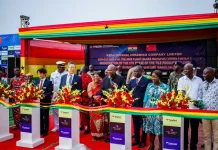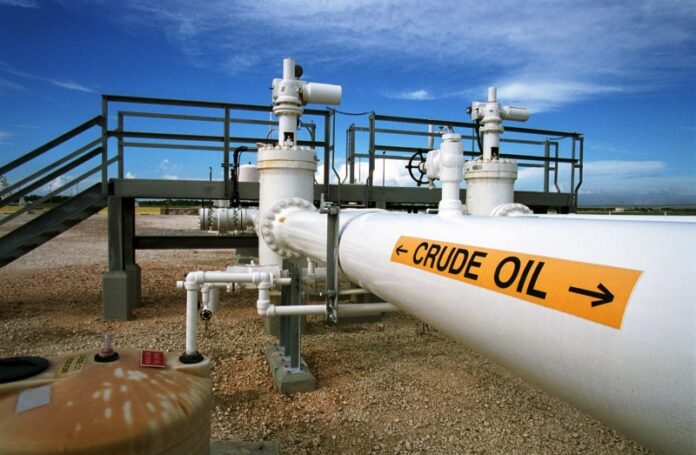JOHANNESBURG, South Africa, February 4, 2022/ — Oil reliant African counties are faced with newfound challenges regarding production decline, with aging infrastructure, reduced financing for oil and gas projects, and the increasing pressure to abandon resources all together hindering sectoral growth.
In an exclusive interview with the African Energy Chamber (AEC) (www.EnergyChamber.org), Valentine Ugbeide, Executive Chairman of Moore Oil Exploration and Production Nig Limited and CEO of Gremoore Limited, provided insight into the primary issues influencing production decline, how this can be turned around, and his recommendations regarding an industry approach to low carbon gas monetisation and financing in Africa.
What will this production underperformance in Nigeria, Libya, Angola, Congo, Equatorial Guinea, and African countries mean for the continent as a whole?
Looking at the issue from a broad perspective, low production performance in the major oil-producing countries and others in the continent of Africa directly translates to budgets being significantly impaired and this is due to the fact that over 70% of revenues are derived from oil production and most of these nations would not have an adequate fiscal hedge to enable them to manage the slump in production.
Take the Nigerian economy for instance, it is heavily dependent on the oil sector, which, accounts for over 95 percent of export earnings and about 40 percent of government revenues, according to the International Monetary Fund. And this is similar to some other African countries as well. The decrease in production for oil and gas in Africa also means that the government would have difficulty financing development programs.
What do you feel are the primary reasons influencing production decline in Africa?
Understanding the causative issues that have resulted in the decline of Africa’s oil production really is the first step in addressing the issue of decline on the Continent. Nations in Africa all have their unique structures and processes so it is difficult to pinpoint a specific issue that might be ravaging all the nations but a problem that has plagued these countries is the lack of investment in the industry.
Poor infrastructure and competent expertise are also factors that have affected the decline in production. And when you take a closer look at Nigeria for example, and you find the devastating state of the oil pipelines due to recurrent attacks by militants, this also explains some of the reasons for the decline.
And although Oil prices have risen significantly above levels not seen since 2014, African Nations have been unable to prop up production to a level that allows governments to take advantage and reap the benefits of the oil price increase. One other primary reason that hastened the decline in oil production is the effect of The Coronavirus pandemic.
With the issuance of travel bans and reduction of economic activities in countries like China and Canada that accounted for over 80% and 60% respectively of global oil consumption, the oil production fell to unprecedented levels largely caused by an oversupply of oil in the global markets.
What can be done to turn this around?
We can say that once economic and human activities return to pre-pandemic status, energy consumption would increase. This would in turn increase the oil demand which in turn forces players in the industry to increase the oil production level. Albeit Governments across Africa in conjunction with key industry players must make conscious efforts to attract and invest in the sector to boost production and take advantage of any future demand increase in the international market.
Also, taking a cue from Nigeria, where Marginal field bid rounds were recently completed after a rigorous process by the government and eligible Indigenous Oil Companies were awarded Marginal fields, we can expect that production levels will increase as soon as they begin to see first oil, and this will certainly be a great win for the Nation and the Continent.
What would you recommend as an industry approach to low carbon gas monetisation and financing in Africa?
Consistent widespread education on the benefits of low carbon gas really is the substratum of its monetisation. High-level executives in the industry need to start and push the conversation in every room that they are in. We see what Total Energies has done and is still doing, being able to attempt saddling the best of both worlds is highly commendable and motivating.
We know that low-carbon gases help minimise the impacts of climate change on humanity, so it is paramount that every level of the industry understands this and begins to consciously think up innovative strategies to enhance its monetisation.
The governments on the continent need to further put in place policies and incentives that encourage the use of low carbon gases in order to drive demand high and spur an increase in supply. Serving as the CEO at Gremoore Limited & the Executive Chairman of Moore Oil Exploration and Production Limited and having worked in the O&G industry for over 20 years, I understand first-hand the importance and impacts of great policies. These policies are needed to create a friendly investment terrain in order to attract foreign direct investment into the industry.
What should new independents consider while entering a changing African energy sector?
It is common knowledge that the energy sector generally is an interesting one to participate in, and this is majorly due to its high level of volatility. The African energy sector does pose its unique challenges but offers great opportunities and rewards. You will find easily that a variety of the issues we face as a sector are cyclical in nature, so a good study and research will arm you up in terms of what to expect from the sector.
Up until the COVID 19 pandemic, this should have been sufficient but currently, we are also faced with the issue of the energy trilemma and a huge urgency to pivot to sustainable energy. Common traits for survivors in the industry is the ability to adapt, be hardy, and flexible. These attributes have been a trademark for us at Gremoore and we continue to push the boundaries in our industry.
Is it time for Model Gas/LNG Production Sharing Agreement?
This is a great question and there is no better time to have this conversation than now! Over the years, PSA’s have posed to be a great avenue through which projects in the Oil industry were carried out. Although it does come along with its distinctive challenges, it would provide a means for knowledge transfer, minimised risks for the host countries involved as well as diverse cost recovery strategies. At a time where we urgently need to cascade the production of low carbon gas, as an industry we should definitely consider utilising PSA’s.
What pending deals do you believe should be completed and announced at African Energy Week in Cape Town.
I definitely look forward to the Tanzania LNG Liquefaction Plant (TLNGP), a $30 billion project that has been stalled since 2016. According to Nes Fircroft, The facility when completed will have the capacity of 10 million tonnes cubic feet of gas per annum, while the construction phase will not only boost the economy of Tanzania but the majority of East Africa.
Notwithstanding the governmental complications with the project, the owners Equinor, Shell, ExxonMobil, Ophir Energy and Pavilion Energy have continued with developmental plans. And there are strong indications by the Tanzania Government that the project construction phase will commence 2022, with the facility fully operational in 2028.
Another deal I would be ecstatic about is the Ogidigben Gas Revolution Industrial Park (GRIP). This project is long-planned and located in the Gas Revolution Industrial Park in Ogidigen, Delta State, Nigeria. With an estimated $20 billion for construction, the project has the capacity to rejuvenate the economy of Southern Nigeria while establishing Nigeria’s dominance in the gas sector in Africa.
There have been many delays since its conception in 2017 due to security and community issues. However, the present government has indicated strongly its desire to commence the project that could add a potential 18 trillion cubic feet of gas to the Nigerian gas supply chain. An estimated 250,000 jobs will also be created from this project.
Let’s just say it would be great to have these projects and the just recently commenced Rovuma LNG Liquefaction Plant project located in Mozambique announced at the African Energy Week in Cape Town as these will not only improve Africa’s economy but position it as one of the leading continents for international gas supply globally.
AEW 2022 is the AEC’s annual conference, exhibition, and networking event. AEW 2022 unites African energy stakeholders with investors and international partners to drive industry growth and development and promote Africa as the destination for energy investments. For sales-related inquiries please contact register@AEW2021.com.








































